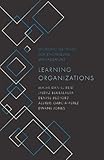Learning organizations / authored by Malva Daniel Reid (University of the District of Columbia, USA), Jyldyz Bekbalaeva (American University of Central Asia, Kyrgyzstan), Denise Bedford (Georgetown University, USA), Alexeis Garcia-Perez (Coventry University, UK), Dwane Jones (University of the District of Columbia, USA).
Series: Working methods for knowledge managementPublisher: Bingley, U.K. : Emerald Publishing Limited, 2021Copyright date: ©2021Description: 1 online resource (180 pages)Content type:- text
- computer
- online resource
- 9781839824326
- 658.3124 23
- HD58.82 .R45 2021
Includes index.
Part 1. Learing in the knowledge economy -- Chapter 1. Knowledge capital and the knowledge economy -- Chapter 2. Learning -- Chapter 3. Learning cultures -- Chapter 4. Designs for learning -- Part 2. Learning environments -- Chapter 5. Learning at the organization level -- Chapter 6. Learning at the team or group level -- Chapter 7. Learning at the individual level -- Part 3. Developing learning strategies -- Chapter 8. Designing and developing an organization-wide learning strategy -- Chapter 9. Communicating and socializing the learning strategy -- Chapter 10. Maintaining and sustaining a learning strategy.
The 21st century economy is fuelled by knowledge. Today, knowledge is more than an idea - it is an economic commodity. An organization's knowledge capital is a competitive and comparative advantage. Every organization must now invest in the knowledge assets of all its employees. Learning is the engine that creates and renews knowledge capital. Learning Organizations delves into why learning is an essential business operation; how modern learning is different from industrial-era training; how to discover learning sources and opportunities; how to design a learning environment and learning strategies that optimize the potential of every employee. This is essential reading for business managers, human resource professionals, and academic researchers studying knowledge economies, knowledge, and intellectual capital.
Print version record.
There are no comments on this title.

